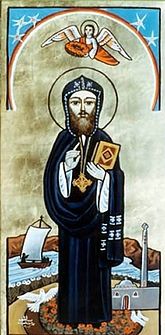Severus of Antioch
| Saint Severus the Great | |
|---|---|
 |
|
| Patriarch | |
| Born | 465 Sozopolis, Byzantine Empire |
| Died | 8 February 538 Sakha, Byzantine Empire |
| Venerated in | Oriental Orthodoxy |
| Feast | 8 February |
St. Severus the Great of Antioch (Syriac: ܣܘܪܘܣ ܕܐܢܛܝܘܟܝܐ), was a Greek monk and theologian. He was the last Monophysite Patriarch of Antioch and is honoured as a saint in the Syriac Orthodox Church and Oriental Orthodoxy in general.
Severus was born to a family of Greek origin in the town of Sozopolis in the Roman province of Pisidia. In Alexandria, he studied grammar and rhetoric in Latin and Greek. Severus later studied law and philosophy at the famous law school in Berytus. Severus was baptised in 488 in the Church of the Martyr Leontius in Tripolis.
He almost at once openly united himself with the Acephali, repudiating his own baptism and his baptiser, as well as the Christian church itself, believing it to be infected with Nestorianism. Upon embracing Monophysite doctrines, Severus became a monk at the monastery of Saint Romanus between Gaza and the port of Maiuma. Here he met Peter the Iberian, the bishop of Maiuma. Severus was later ordained as a priest before joining a Monophysite brotherhood near Eleutheropolis under the archimandrite Mamas.
At this time Severus rejected the Henotikon of Emperor Zeno, dismissing it as "the annulling edict", and "the disuniting edict", and condemned Peter Mongus, the Monophysite patriarch of Alexandria, for accepting it. We next hear of him in an Egyptian monastery, whose abbot Nephalius having been formerly a Monophysite, now embraced the Council of Chalcedon. In the resulting disagreement, Nephalius expelled Severus and his supporters.
...
Wikipedia
